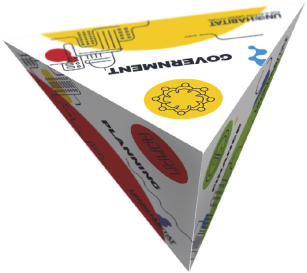metrohub toolkits

MetroHUB has developed a toolkit for improving capacities of metropolitan managers on several topics, namely governance, planning instruments, policy development, financing mechanisms and regulatory frameworks at the regional and metropolitan levels. The toolkit consists of 3 guides:
1. Metropolitan INSTITUTIONS
This document on Metropolitan Institutions offers a guide for the structuring and implementing supra-municipal institutions responsible for managing metropolitan common affairs and sectorial issues with metropolitan impact. It highlights the importance of metropolitan institutions for effective territorial management and competitiveness. The guide contains tips for defining metropolitan institutions typology, characteristics, objectives, functions and structure. Also, it includes a metropolitan management methodology and recommendations for its implementation. Metropolitan institutions facilitate territorial management, making the use of resources more efficient through territorial coordination and complementarity, identifying the vision of integrated development, building policies that respond to the intersectionality of problems, and articulating the scales of government and executing projects. The Metropolitan institutions think, plan and develop strategies for territorial competitiveness and the improvement of citizens quality of life.
- Urban dynamics that affect or enhance metropolitan development.
- Metropolitan projects for equity in territorial development.
- Policies and regulations needed for metropolitan coordination.
- Territorial phenomena for land-use planning.
2. Metropolitan Management and Planning Methodologies
This document on Metropolitan Management and Planning Methodologies has the purpose of strengthening the capacities and competences of the governments and local actors experimenting the metropolitan phenomena. MetroHUB methodologies give metropolitan actors a greater understanding of the metropolitan territorial dynamics, through experimental methods that lead them to propose ideas to better plan, govern, finance and manage metropolitan areas, generating skills to formulate territorial development strategies in accordance with their metropolitan realities and, based on the principle of the integration of territorial management. MetroHUB methodologies address topics such as: i) Planning of intra-metropolitan borders; ii) Governance of metropolitan interdependencies; iii) Participatory metropolitan planning; iv) Metropolitan vision and management; v) Metropolitan innovation; vi) Dialogue of metropolitan peers; vii) Innovation in metropolitan projects; and viii) Metropolitan impact of territorial projects. Furthermore, this document contains training methodologies and experience exchange to deepen the knowledge of metropolitan phenomena and metropolitan territorial management.
- Urban dynamics that affect or enhance metropolitan development.
- Metropolitan projects for equity in territorial development.
- Policies and regulations needed for metropolitan coordination.
- Territorial phenomena for land-use planning.
3. Metropolitan Observatories
In this guide on Metropolitan Observatories you will find the conceptualization and characterization of a metropolitan observatory, the basic elements of its structure, the qualities of the information it produces, the focus themes and sources of its indicators, and a route for its design and implementation. It offers a guide for generating metropolitan knowledge as technical support to strengthen capacities in metropolitan planning and development. Metropolitan observatories contribute to co-building sustainable metropolitan development, by producing quality information and monitoring metropolitan dynamics to assess progress in sustainable territorial development. Metropolitan observatories facilitate the identification of:
- Urban dynamics that affect or enhance metropolitan development.
- Metropolitan projects for equity in territorial development.
- Policies and regulations needed for metropolitan coordination.
- Territorial phenomena for land-use planning.

Metropolitan Management Pyramid
The Metropolitan Management Pyramid is a methodology that allows key actors in the metropolis defining a framework for metropolitan management as well as a route for improving metropolitan planning, governance and finance.
The pyramid gathers the concept and scope of the metropolitan management model, based on the integration of governance, planning and financing, identifying 12 issues for “Leaving no one and no place behind in metropolitan management”.

